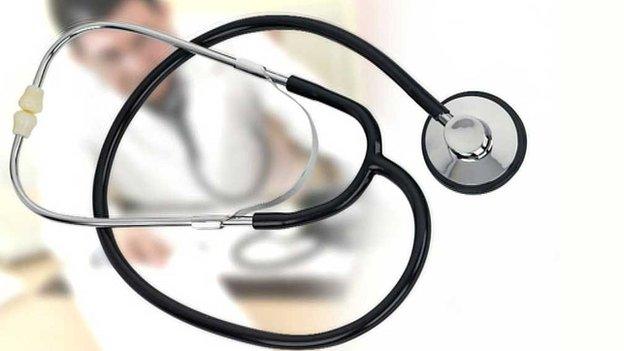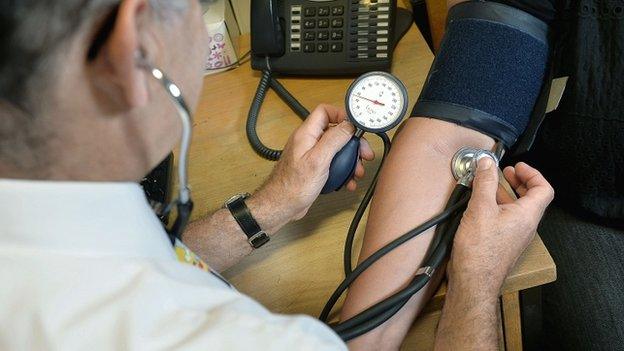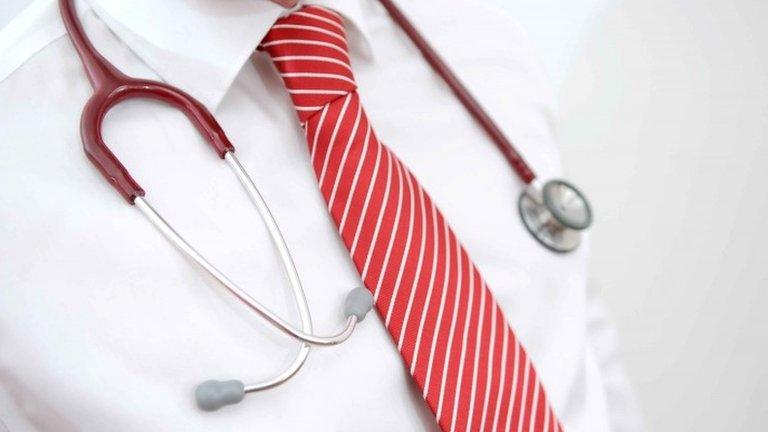GP shortages put pressure on doctors and patients
- Published

Have you ever struggled to get a GP appointment?
An investigation by the BBC has uncovered a national shortage of GPs, doctors deserting the profession and junior doctors avoiding what they see as an "unglamorous" career.
All these have culminated in the number of unfilled GP posts quadrupling in the past three years, which may help explain why your surgery's phone number is often engaged.
Overstretched GPs
Surgeries are certainly struggling with growing workloads.
One in Whitehaven in Cumbria opened its phone lines at 08:00, and all 49 appointments disappeared within 12 minutes.
BBC Inside Out has been taking the temperature of doctors across England to find out what is troubling them about GP practice
Dr Guy Clayton, a GP from Beverley in Yorkshire, told BBC Inside Out: "At the age of 48, like a lot of GPs, I'm looking forward to retiring from the NHS.
"I never expected to be saying that at this stage in my career. The physical volume of the work does take its toll.
"I do feel that general practice is on the verge of being irreparably broken."
An exclusive BBC Inside Out ComRes survey of 1,004 GPs across the UK found that 56% of doctors expect to retire or leave general practice before the age of 60.
Survey of UK GPs
25%
Percentage of GPs definitely leaving the service before 60
-
30% Will probably leave
-
32% Probably not leaving
-
6% Definitely not leaving
-
6% Don't know
Appointment pressures
BBC Inside Out follows the work of Cumbria's out-of-hours doctor service which is increasingly busy because patients cannot get regular GP appointments
Pressure is also being felt by other health practitioners and out-of-hours services which are picking up the demand for GP services.
In the north of England, the out-of-hours doctor service, Cumbria Health On Call (Choc), said it is increasingly busy because people call them when they cannot get a GP appointment.
The Choc centres, which are open outside GP hours at weekends and evenings, take up to 3,000 calls a week from patients struggling to get appointments during the working week.
In Carlisle, one in three GP surgeries has unfilled vacancies for doctors, leaving 20,000 patients, in effect, without a doctor and putting extra pressure on existing GPs in the city.
Growing GP shortages
It is a picture which is reflected across England where Health Secretary Jeremy Hunt said that the results of the BBC Inside Out survey were "worrying".
But he told Inside Out a new government programme designed to encourage doctors to come back into general practice will tackle the recruitment issue.
So where does that leave the current state of GP services across the UK?
The west of England requires 25% more GPs by 2020 to keep up with demand for services, according to the Royal College of General Practitioners.
The private sector is answering the need in some places. At a new private GP practice in Bristol called the Medical, patients pay a membership fee like a gym, and then buy appointments when they need them or in bulk.
Closures are also becoming more common. The Kington Medical Practice in Herefordshire is typical in that it has been forced to close two of its branch surgeries, as a result of a continuing shortage of GPs.
According to its website, the practice has 7,900 registered patients over an area of nearly 600 sq miles, all of whom are now served by a single surgery.
Students shun GP practice
The GP shortage is being exacerbated by the declining number of students going into GP practice as a speciality.
In 2013, only 20% of medical students chose to work in general practice on completion of their foundation training despite a national target of 50% by 2016.
Why GPs think medical students are shunning the profession
27%
Volume of consultations
-
22% Other
-
20% Standing within profession
-
19% Working hours
-
9% Pay (3% don't know)
Work pressures and the declining status of the profession were the reasons cited by young medical students whom Inside Out spoke to at Imperial College in London.
Mitul Patel, a final-year student, said: "Your work environment is so pressured and stressful as a GP. It puts current and prospective GP trainees off."
The perception of GP practice as a "second rate" career choice is something which medical students claimed they had come across from other doctors during their training.
Rob Cleaver, editor of the Medical Student, said: "If we're told something's second rate, you instantly disregard it. I've seen people actually taken aback when someone else has said, 'I'd like to be a GP.'"
A broken system?

GPs are facing workload pressures and an increasing volume of consultations
Dr Krishna Kasaraneni from the British Medical Association stressed the need for a solution to the number of GPs leaving the service.
"Politicians across the board need to acknowledge that general practice is not resourced and funded correctly.
"Trying to ask GPs to do more and more work, and not resourcing and staffing it correctly, will mean general practice will break."
BBC Inside Out talks to Health Secretary, Jeremy Hunt, about how he is tackling the shortage of GPs and doctors leaving GP practice
Mr Hunt told Inside Out: "Hospitals have been struggling to meet increasing demand and that has taken money away from services like GPs, mental health and district nursing.
"That was wrong and we're moving to correct that. The centre of gravity in the NHS for 66 years has been big hospitals.
"We need to change that and make the centre of gravity general practice and out-of-hospital care."
But as the UK's population gets older and GPs continue to leave the profession, these changes will need to work fast before more drastic treatment is required to tackle the mounting GP shortage.
Inside Out is broadcast on Monday, 2 March on BBC One England at 19:30 GMT and nationwide for 30 days on the iPlayer thereafter.
- Published2 March 2015

- Published4 November 2014
- Published30 September 2014